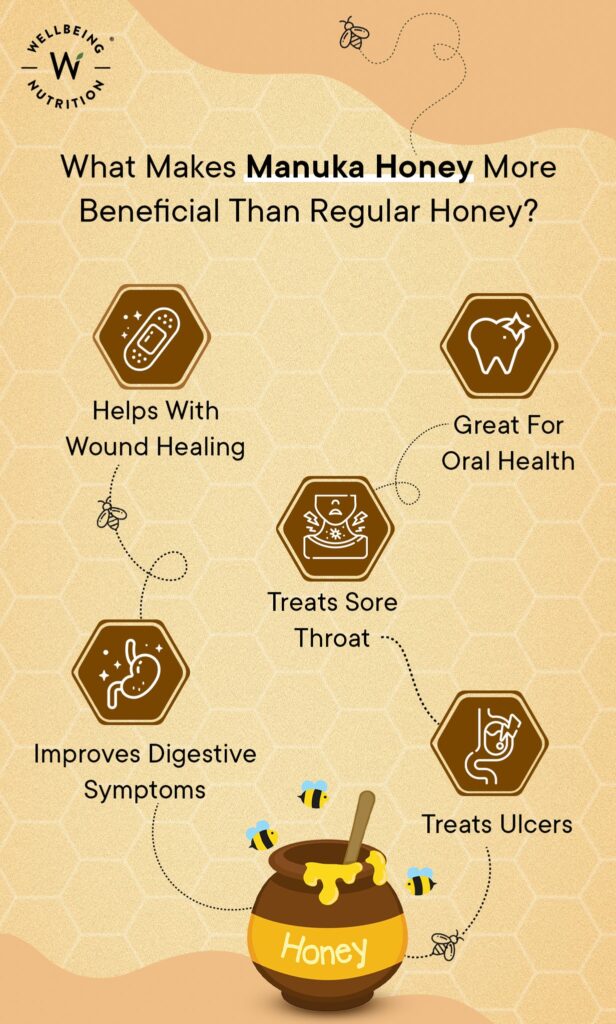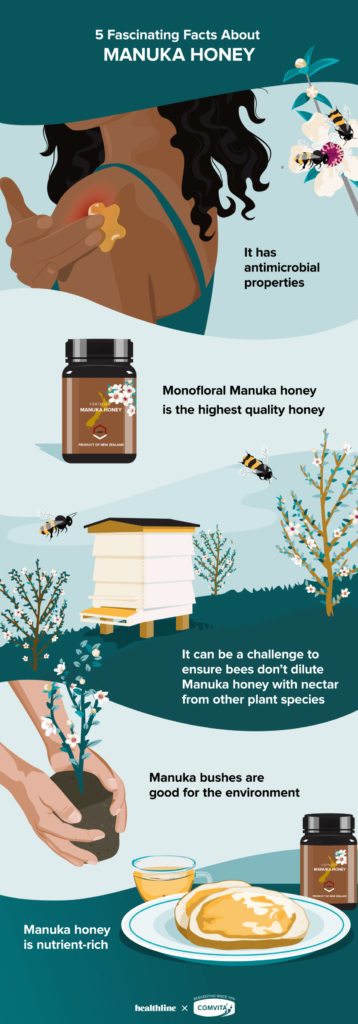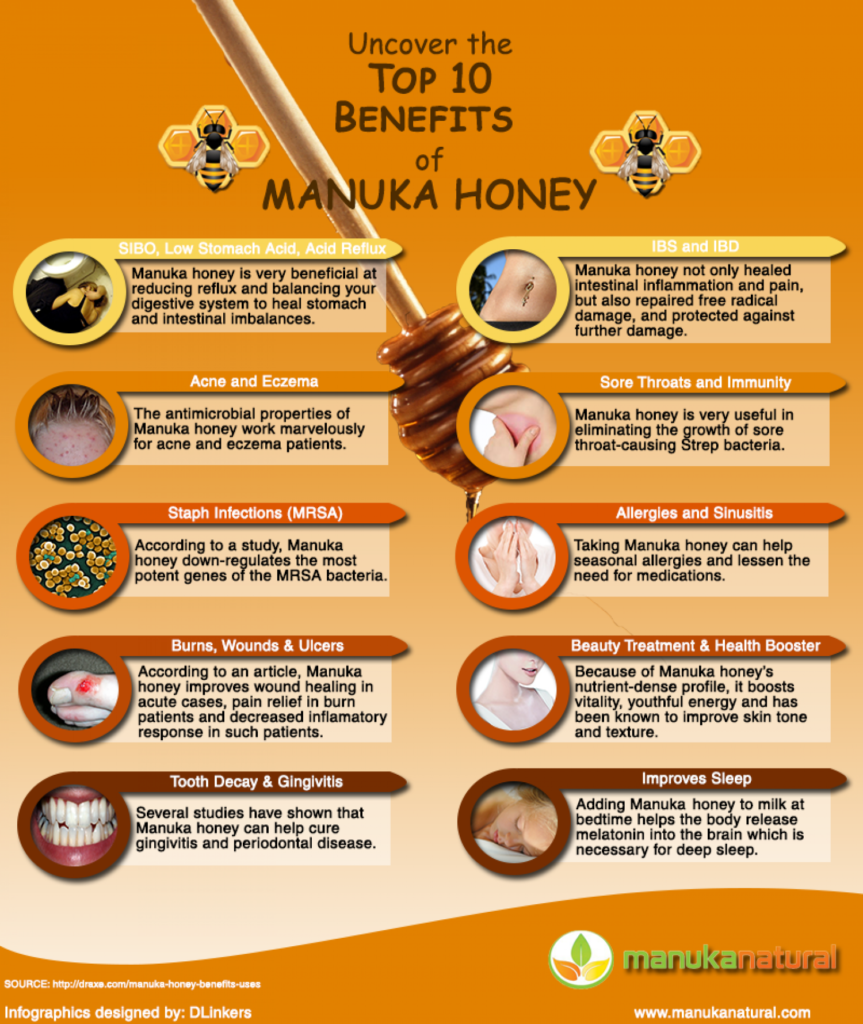
Have you ever heard of Manuka honey? If not, you’re in for a treat! In this article, you will learn about the incredible health benefits that this special type of honey offers. Manuka honey, sourced from New Zealand, has been cherished for centuries for its potent antibacterial properties. It’s not just your ordinary honey, as it contains unique active compounds that can promote wound healing, soothe sore throats, and boost your immune system. Get ready to be amazed by the wonders of Manuka honey and how it can positively impact your health.

What is Manuka Honey?
Manuka honey is a unique type of honey that is derived from the nectar of the Manuka tree, which is native to New Zealand. This honey has gained significant attention in recent years due to its exceptional health benefits and therapeutic properties. Unlike traditional honey, Manuka honey possesses exceptional antibacterial properties, making it a valuable natural remedy for various ailments. In addition to its antibacterial effects, Manuka honey also exhibits anti-inflammatory properties, aids in wound healing, promotes digestive health, and boosts the immune system. With such a diverse range of benefits, it is no wonder why Manuka honey has become increasingly popular among health-conscious individuals.
Definition of Manuka Honey
Manuka honey is a specific type of honey that is produced by bees that feed on the flowers of the Manuka tree, scientifically known as Leptospermum scoparium. While honey is traditionally produced from the nectar of various flowers, Manuka honey is unique because it is exclusively derived from the Manuka tree. This distinctive floral source gives Manuka honey its distinct flavor profile and exceptional therapeutic properties.
Source and Harvesting of Manuka Honey
The Manuka tree, from which the bees collect nectar to make Manuka honey, is primarily found in remote areas of New Zealand. The pristine environment and unpolluted air contribute to the purity and quality of the honey produced. Beekeepers carefully place their beehives in these remote regions, allowing the bees to forage on the Manuka tree’s flowers. The harvesting process involves collecting the honeycombs from the hives and carefully extracting the honey, ensuring that its natural properties remain intact. This meticulous sourcing and harvesting process ensures that Manuka honey retains its unique and potent health benefits.
Composition of Manuka Honey
Manuka honey is composed of various organic compounds that contribute to its exceptional health benefits. It contains a high concentration of natural sugars, primarily glucose and fructose, which provide a quick and sustained source of energy. Additionally, Manuka honey contains enzymes that contribute to its antibacterial properties and promote overall digestive health. The presence of antioxidants, vitamins, and minerals in Manuka honey further enhances its therapeutic properties and supports the immune system. The unique composition of Manuka honey sets it apart from traditional honey, making it a true superfood for optimal health.
Unique Health Benefits of Manuka Honey
Manuka honey stands out among other honey varieties due to its unparalleled health benefits. Its unique combination of antibacterial properties, anti-inflammatory effects, wound healing capabilities, digestive health benefits, and immune-boosting properties make it a versatile natural remedy for a wide range of ailments.
Antibacterial Properties
Perhaps the most remarkable aspect of Manuka honey is its potent antibacterial properties. Manuka honey contains a natural compound called methylglyoxal (MGO), which is responsible for its powerful antibacterial activity. This compound inhibits the growth of harmful bacteria, making Manuka honey effective in treating infections, both internally and externally. The antibacterial action of Manuka honey extends to antibiotic-resistant strains, making it a valuable alternative to traditional antibiotics.
Anti-inflammatory Effects
Inflammation is a natural response by the body to injury or infection. However, chronic inflammation can contribute to the development of various diseases. Manuka honey possesses anti-inflammatory effects that can help reduce inflammation in the body. The bioactive compounds present in Manuka honey, such as flavonoids and phenolic acids, work synergistically to suppress inflammatory pathways, providing relief from conditions such as arthritis, sinusitis, and inflammatory bowel diseases.
Wound Healing
Manuka honey has been used for centuries as a natural remedy for wound healing. Its antibacterial properties help prevent infection, while its ability to promote the regeneration of healthy tissue accelerates the healing process. The application of Manuka honey to wounds, cuts, and burns creates a protective barrier that prevents bacteria from entering the wound and reduces the risk of scarring.
Digestive Health
Manuka honey has a soothing effect on the digestive system, making it a valuable remedy for various digestive disorders. It can help alleviate symptoms such as acid reflux, heartburn, and gastritis. The enzymes present in Manuka honey aid in the digestion and breakdown of food, promoting optimal gastrointestinal function. Additionally, Manuka honey exhibits prebiotic properties, which means it acts as a food source for beneficial gut bacteria, supporting a healthy balance of microorganisms in the gut.
Boosts Immune System
Consuming Manuka honey regularly can significantly boost the immune system. The antioxidants present in Manuka honey neutralize harmful free radicals and protect the body against oxidative stress. Furthermore, Manuka honey supports the production of immune cells, such as lymphocytes and macrophages, which are essential for a robust immune response. By strengthening the immune system, Manuka honey helps defend against common illnesses and enhances overall immune function.
Antibacterial Properties of Manuka Honey
One of the most significant benefits of Manuka honey is its extraordinary antibacterial properties. In comparison to traditional antibiotics, Manuka honey demonstrates superior effectiveness against bacterial strains.
Manuka Honey vs. Traditional Antibiotics
Traditional antibiotics are commonly used to treat bacterial infections. However, widespread antibiotic resistance has become a global health concern. Antibiotic-resistant bacteria are strains of bacteria that have developed immunity to the effects of antibiotics, making them difficult to eradicate. Manuka honey offers an effective alternative to traditional antibiotics, as it has been proven to be effective against antibiotic-resistant strains.
How Manuka Honey Fights Bacteria
The antibacterial properties of Manuka honey primarily stem from its high concentration of MGO. MGO has been found to penetrate bacterial cell walls and disrupt their metabolic processes, ultimately leading to their destruction. Additionally, the low water content and acidic pH of Manuka honey create an environment unfavorable for bacterial growth. This multifaceted approach makes Manuka honey a potent natural antibacterial agent.
Effective against Antibiotic-Resistant Strains
Due to the rise of antibiotic-resistant strains of bacteria, finding effective treatment options has become a challenge. However, Manuka honey has been proven to be effective against antibiotic-resistant strains such as MRSA (Methicillin-resistant Staphylococcus aureus) and VRE (Vancomycin-resistant enterococci). Its unique antibacterial properties make it a valuable natural remedy to combat these stubborn bacterial infections.
Anti-inflammatory Effects of Manuka Honey
Chronic inflammation is a common underlying factor in various health conditions. Manuka honey possesses anti-inflammatory effects that can help alleviate symptoms and support overall well-being.
Reduces Inflammation in the Body
The bioactive compounds present in Manuka honey, such as flavonoids and phenolic acids, have been shown to reduce inflammation in the body. These compounds work by inhibiting the production of pro-inflammatory molecules, thereby calming the inflammatory response. By reducing inflammation, Manuka honey can help manage conditions such as arthritis, allergies, and autoimmune disorders.
Alleviates Symptoms of Inflammatory Conditions
Inflammatory conditions, such as sinusitis, bronchitis, and inflammatory bowel diseases, can cause discomfort and negatively impact quality of life. The anti-inflammatory properties of Manuka honey can provide relief from these conditions by reducing inflammation and alleviating symptoms. Whether consumed orally or applied topically, Manuka honey can offer natural relief and promote overall well-being.
Supports Joint Health
Inflammation is often a key contributor to joint pain and stiffness. Manuka honey’s anti-inflammatory effects can help alleviate symptoms of arthritis and support joint health. By reducing inflammation in the joints, Manuka honey may help improve mobility and enhance overall joint function.

Wound Healing Benefits of Manuka Honey
Manuka honey has been used for centuries as a natural remedy for wound healing. Its unique properties make it highly effective in promoting the healing process and preventing infection.
Accelerates Healing Process
When applied topically to wounds, cuts, or burns, Manuka honey accelerates the healing process by providing a moist environment conducive to tissue regeneration. The natural sugars in Manuka honey draw moisture to the wound, promoting hydration and the growth of healthy tissue. Additionally, the antibacterial properties of Manuka honey prevent infection, allowing the wound to heal more rapidly.
Promotes Tissue Regeneration
Manuka honey contains specific enzymes that promote the production of growth factors, which are essential for tissue regeneration. These growth factors facilitate the formation of new blood vessels and the production of collagen, the main protein responsible for skin strength and elasticity. By promoting tissue regeneration, Manuka honey helps wounds close faster and reduces the risk of scarring.
Prevents Infection
The antibacterial properties of Manuka honey play a crucial role in preventing infection in wounds. Bacterial infections in wounds can lead to complications, delay the healing process, and increase the risk of further complications. Manuka honey’s ability to inhibit bacterial growth helps create a protective barrier, preventing bacteria from entering the wound and reducing the risk of infection.
Reduces Scarring
Scarring is a common concern when it comes to wound healing. The unique properties of Manuka honey can help minimize the appearance of scars and promote smooth, healthy skin regeneration. By supporting the growth of new tissue and preventing infection, Manuka honey contributes to a more aesthetically pleasing healing outcome.
Manuka Honey for Digestive Health
Digestive health is essential for overall well-being, and Manuka honey can be a valuable addition to promote optimal gastrointestinal function.
Soothes Digestive Issues
Manuka honey has a soothing effect on the digestive system, making it beneficial for various gastrointestinal issues. The smooth, viscous consistency of honey helps coat the lining of the stomach and intestines, reducing discomfort associated with conditions such as gastritis and gastric ulcers. Consuming Manuka honey can provide relief from heartburn, indigestion, and other digestive discomforts.
Relieves Acid Reflux and Heartburn
Acid reflux and heartburn occur when stomach acid flows back into the esophagus, causing a burning sensation in the chest. Manuka honey can help alleviate these symptoms by forming a protective barrier on the inner lining of the esophagus. Its anti-inflammatory properties reduce inflammation in the esophagus, providing natural relief from acid reflux and heartburn.
Improves Gut Health
A healthy gut is vital for overall well-being, as it plays a significant role in digestion, nutrient absorption, and immune function. The prebiotic properties of Manuka honey promote a healthy balance of gut bacteria by providing nourishment to beneficial microorganisms. A balanced gut microbiome supports optimal digestion, nutrient absorption, and immune system function.
Combats H. pylori Bacteria
Helicobacter pylori (H. pylori) is a bacterium that can cause ulcers, gastritis, and other digestive disorders. Manuka honey has been shown to inhibit the growth of H. pylori bacteria, making it a natural remedy for combating this harmful microorganism. By reducing the level of H. pylori in the digestive system, Manuka honey can help relieve symptoms and promote overall digestive health.

Boosting the Immune System with Manuka Honey
A robust immune system is essential for maintaining optimal health and preventing illness. Manuka honey can play a significant role in boosting the immune system and protecting against common illnesses.
Rich in Antioxidants
Antioxidants are powerful compounds that help neutralize harmful free radicals in the body. Manuka honey contains a variety of antioxidants, such as phenols and flavonoids, which protect cells from oxidative damage and support the immune system. By consuming Manuka honey regularly, you can enhance your body’s natural defense mechanisms.
Supports the Production of Immune Cells
The production of immune cells is crucial for a strong immune system. Manuka honey contains specific compounds that support the production of immune cells, such as lymphocytes and macrophages. These cells play a vital role in identifying and eliminating harmful pathogens, providing an enhanced immune response.
Protects against Common Illnesses
The antibacterial and antiviral properties of Manuka honey help protect against common illnesses, such as the cold and flu. Consuming Manuka honey during periods of increased vulnerability, such as changing seasons or exposure to sick individuals, can provide an extra layer of defense against common pathogens.
Enhances Overall Immune Function
By boosting antioxidant levels, supporting immune cell production, and offering protective properties against pathogens, Manuka honey enhances overall immune function. A strong immune system is essential for optimal health, as it helps prevent illness and promotes a quicker recovery when illness does occur.
Choosing and Using Manuka Honey
To fully enjoy the health benefits of Manuka honey, it is essential to choose and use it correctly.
Understanding the UMF or MGO Rating
Manuka honey is graded based on its Unique Manuka Factor (UMF) or Methylglyoxal (MGO) rating. These ratings reflect the potency and quality of the honey, with higher numbers indicating a higher concentration of beneficial compounds. It is recommended to choose Manuka honey with a UMF rating of 10+ or an MGO rating of 250+ to ensure optimal health benefits.
Identifying Authentic Manuka Honey
Due to the popularity of Manuka honey, there are instances of counterfeit or adulterated products in the market. To ensure you are purchasing authentic Manuka honey, look for reputable brands that carry a UMF or MGO certification. These certifications guarantee the authenticity and quality of the honey, allowing you to enjoy its full range of health benefits with confidence.
Proper Storage and Shelf Life
To preserve the quality of Manuka honey, it should be stored in a cool, dry place away from direct sunlight. Exposure to heat, humidity, and sunlight can degrade its beneficial compounds and reduce its potency. If stored correctly, Manuka honey has a long shelf life and can be enjoyed for months or even years.
Incorporating Manuka Honey into Your Diet
Manuka honey can be incorporated into your diet in various ways. It can be used as a natural sweetener in beverages such as tea or smoothies, drizzled over yogurt or oatmeal, or used as a spread on toast. The versatility of Manuka honey allows for endless possibilities to enjoy its unique flavor and reap its health benefits.

Manuka Honey and Skincare
In addition to its internal health benefits, Manuka honey has gained popularity in the skincare industry due to its numerous advantages for skin health.
Benefits for Skin Health
Manuka honey possesses antibacterial and anti-inflammatory properties that make it a valuable ingredient in skincare products. Its natural ability to hydrate the skin, promote wound healing, and reduce inflammation makes it suitable for various skin concerns.
Treating Acne and Eczema
Acne and eczema are common skin conditions that can cause frustration and discomfort. Manuka honey’s antibacterial properties help combat acne-causing bacteria and reduce inflammation associated with acne breakouts. Its soothing effect calms irritated skin in individuals with eczema, providing relief from itching and promoting healing.
DIY Manuka Honey Face Masks
A simple and effective way to incorporate Manuka honey into your skincare routine is by creating DIY face masks. Mixing Manuka honey with other natural ingredients such as yogurt, oatmeal, or lemon juice can help create a rejuvenating and nourishing face mask. These face masks can help hydrate the skin, reduce redness, and enhance the overall complexion.
Anti-aging Effects
The antioxidant properties of Manuka honey contribute to its anti-aging effects. By neutralizing free radicals and protecting against oxidative stress, Manuka honey can help reduce the signs of aging, such as fine lines and wrinkles. Regular use of Manuka honey in skincare can promote a youthful and radiant complexion.
Conclusion
Manuka honey is a natural health aid that offers a plethora of benefits for overall well-being. From its exceptional antibacterial properties to its anti-inflammatory effects, wound healing capabilities, digestive health benefits, and immune-boosting properties, Manuka honey is a versatile and valuable addition to any lifestyle. By incorporating Manuka honey into your diet, skincare routine, or medicinal regimen, you can harness the power of this remarkable honey to support your health and enhance your quality of life. Discover the wonders of Manuka honey and experience the incredible benefits it has to offer.
